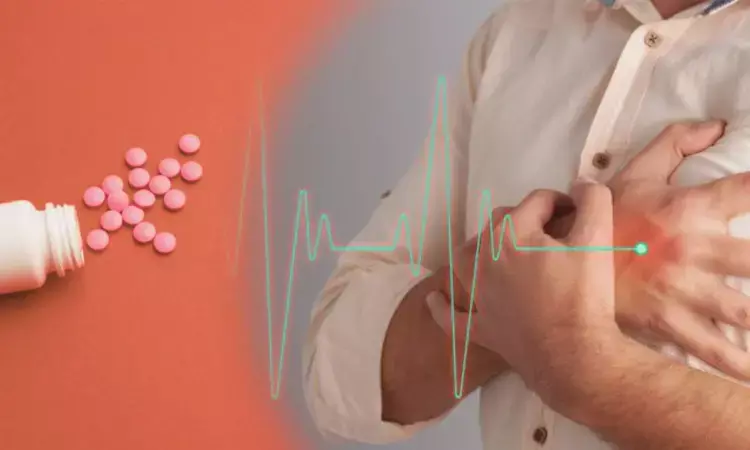- Home
- Medical news & Guidelines
- Anesthesiology
- Cardiology and CTVS
- Critical Care
- Dentistry
- Dermatology
- Diabetes and Endocrinology
- ENT
- Gastroenterology
- Medicine
- Nephrology
- Neurology
- Obstretics-Gynaecology
- Oncology
- Ophthalmology
- Orthopaedics
- Pediatrics-Neonatology
- Psychiatry
- Pulmonology
- Radiology
- Surgery
- Urology
- Laboratory Medicine
- Diet
- Nursing
- Paramedical
- Physiotherapy
- Health news
- Fact Check
- Bone Health Fact Check
- Brain Health Fact Check
- Cancer Related Fact Check
- Child Care Fact Check
- Dental and oral health fact check
- Diabetes and metabolic health fact check
- Diet and Nutrition Fact Check
- Eye and ENT Care Fact Check
- Fitness fact check
- Gut health fact check
- Heart health fact check
- Kidney health fact check
- Medical education fact check
- Men's health fact check
- Respiratory fact check
- Skin and hair care fact check
- Vaccine and Immunization fact check
- Women's health fact check
- AYUSH
- State News
- Andaman and Nicobar Islands
- Andhra Pradesh
- Arunachal Pradesh
- Assam
- Bihar
- Chandigarh
- Chattisgarh
- Dadra and Nagar Haveli
- Daman and Diu
- Delhi
- Goa
- Gujarat
- Haryana
- Himachal Pradesh
- Jammu & Kashmir
- Jharkhand
- Karnataka
- Kerala
- Ladakh
- Lakshadweep
- Madhya Pradesh
- Maharashtra
- Manipur
- Meghalaya
- Mizoram
- Nagaland
- Odisha
- Puducherry
- Punjab
- Rajasthan
- Sikkim
- Tamil Nadu
- Telangana
- Tripura
- Uttar Pradesh
- Uttrakhand
- West Bengal
- Medical Education
- Industry
SGLT2 Inhibitors may Cut Risk of Arrhythmias and Cardiac Arrest in High-Risk Patients, Study Finds

CHINA: In a recent systematic review and meta-analysis of cardiovascular outcome trials, SGLT2 inhibitors significantly reduce the risk of various cardiac arrhythmias, including tachycardia, supraventricular tachycardia (SVT), atrial fibrillation (AF), and atrial flutter (AFL) in patients with type 2 diabetes mellitus (T2DM), heart failure (HF), and chronic kidney disease (CKD). The analysis also suggests that these medications may reduce the risk of cardiac arrest in CKD patients.
The findings were published online in Reviews in Cardiovascular Medicine.
Sodium-glucose cotransporter 2 inhibitors (SGLT2i) are the hypoglycemic agents widely used for T2D treatment. In addition to lowering blood glucose, SGLT2i protects the kidney and heart, significantly reduces cardiovascular (CV) events, and delays progression to HF and CKD.
In addition to lowering blood glucose, SGLT2i protects the heart and kidney, significantly reduces cardiovascular events, and delays the progression of heart failure and chronic kidney disease. However, prior research has not thoroughly explored the link between SGLT2 inhibitors and the risk of developing cardiac arrhythmias.
Against the above background, Xujie Wang, Xiyuan Hospital, China Academy of Chinese Medical Sciences, Beijing, China, and colleagues aimed to assess the association of SGLT2i with cardiac arrhythmias in patients with type 2 diabetes and without T2DM in cardiovascular outcome trials (CVOTs).
For this purpose, they performed a meta-analysis and systematic review of CVOTs that compared SGLT2 inhibitors with placebo. Online databases were systematically searched from their inception through December 2022. The review focused on CVOTs that reported on cardiovascular or renal outcomes and had a follow-up period of at least six months.
The meta-analysis included 12 CVOTs with 77,470 participants (42,016 SGLT2i versus 35,454 control), including patients with T2DM, heart failure, or chronic kidney disease. Follow-up duration ranged from 9 months to 5.65 years.
The researchers reported the following findings:
- Medications included empagliflozin, canagliflozin, dapagliflozin, and ertugliflozin.
- SGLT2i were associated with a lower risk of tachycardia (risk ratio (RR) 0.86), supraventricular tachycardia (SVT; RR 0.84), atrial fibrillation (AF; RR 0.86) and atrial flutter (AFL; RR 0.75) in patients with T2DM, HF, and CKD. SGLT2i could also reduce the risk of cardiac arrest in CKD patients (RR 0.50).
- SGLT2i therapy was not associated with a lower risk of ventricular arrhythmia and bradycardia.
"These results offer strong support for the use of SGLT2 inhibitors in lowering the risk of cardiovascular disease in patients with type 2 diabetes mellitus, heart failure, and chronic kidney disease. Further prospective trials are necessary to verify the antiarrhythmic effects of SGLT2 inhibitors and to understand their underlying mechanisms better," the researchers concluded.
Reference:
Wang, Xujie, et al. "Association of Sodium-Glucose Cotransporter 2 Inhibitors (SGLT2i) With Cardiac Arrhythmias: a Systematic Review and Meta-Analysis of Cardiovascular Outcome Trials." Reviews in Cardiovascular Medicine, vol. 24, no. 9, 2023, p. 258.
Dr Kamal Kant Kohli-MBBS, DTCD- a chest specialist with more than 30 years of practice and a flair for writing clinical articles, Dr Kamal Kant Kohli joined Medical Dialogues as a Chief Editor of Medical News. Besides writing articles, as an editor, he proofreads and verifies all the medical content published on Medical Dialogues including those coming from journals, studies,medical conferences,guidelines etc. Email: drkohli@medicaldialogues.in. Contact no. 011-43720751


